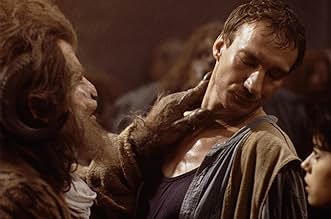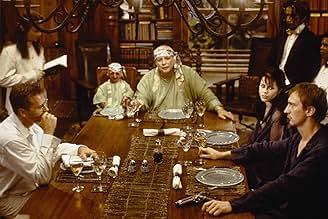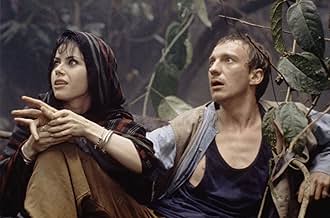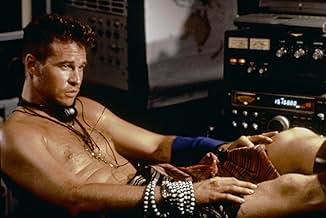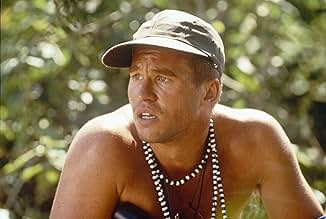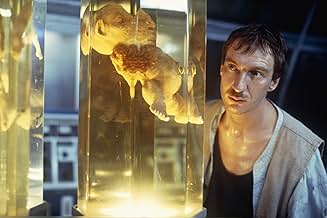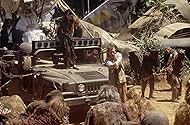Après avoir été secouru et emmené sur une île, un homme découvre que ses habitants sont des animaux de laboratoire transformés en humains étranges, par un médecin visionnaire.Après avoir été secouru et emmené sur une île, un homme découvre que ses habitants sont des animaux de laboratoire transformés en humains étranges, par un médecin visionnaire.Après avoir été secouru et emmené sur une île, un homme découvre que ses habitants sont des animaux de laboratoire transformés en humains étranges, par un médecin visionnaire.
- Récompenses
- 2 victoires et 10 nominations au total
Miguel López
- Waggdi
- (as Miguel Lopez)
Histoire
Le saviez-vous
- AnecdotesAccording to rumor, after the studio fired original director Richard Stanley, he convinced the makeup crew to turn him into one of the background mutants, so he could keep tabs on the making of his dream project. He supposedly did not unmask himself until the wrap party. In his autobiography, Val Kilmer mentioned Stanley would yell at him between takes in dog-man make-up, and Kilmer could recognize his voice but not place him among the many extras.
- GaffesWhen Azazello catches Douglas and Aissa in the underground bunker at the end, David Thewlis' stand-in, dressed in identical clothes, is very clearly in his position in the wide shot.
- Citations
Edward Douglas: Are you a doctor?
Montgomery: Well, I'm more of a vet.
- Versions alternativesThe director's cut contains 4 extra minutes of footage including an expanded intro in the Java sea, a more gruesome end for 'The Father', and other small enhancements
- Bandes originalesNight Bird
Written by Eric Mouquet and Michel Sanchez
Performed by Deep Forest
Courtesy of 550 Music/Epic
By arrangement with Sony Music Licensing
Commentaire à la une
Ever wonder where Col. Kurtz would've ended up had he survived the end of "Apocalypse Now"? Well, now we know: He exiled himself to a deserted island to create humanimals - the horror, the horror.
This 1996 version of "The Island of Dr. Moreau" was such a troubled production that articles, books and documentaries have been made about it, like the 2014 documentary "Lost Soul: The Doomed Journey of Richard Stanley's Island of Dr. Moreau." Stanley championed the project, wrote the screenplay and was set to direct, but was fired after a few days of filming due to conflicts with Val Kilmer, who wasn't in the best of moods due to being served divorce papers while on set.
Actually that wasn't the main reason Stanley was fired. He was fine for small indie productions, but he was out of his league with a blockbuster like this. Veteran filmmaker John Frankenheimer was brought in to save the production from being a complete disaster. He got the job done, but his tyrannical approach didn't help matters.
The production was so bad that Fairuza Balk (the cat-lady, Aissa) literally tried to escape the set, but was caught at the airport in the nick of time. Add to this Brando's well-known eccentricities, not helped by the recent suicide of his daughter, Cheyenne, and constant rewrites and you have a formula for a cinematic chaos!
In light of the horrible production and the ensuing bad press you would think this would be a lousy movie, but it's actually not THAT bad. I can see why some people don't like it because parts of the third act are pretty crazy and don't flow very well, but if you're a sucker for lost-on-an-island type yarns and appreciate the mood & insanity of films like "Apocalypse Now" and the original "Planet of the Apes" ("It's a madhouse, a MADHOUSE!") you'll probably appreciate some of it. Don't get me wrong, it's nowhere near the caliber of either of those films, but comparisons are inevitable and there are entertaining bits.
The main problem is that the story isn't that compelling; the flow of the movie is off, which is mostly apparent in the mounting craziness of the final third, which tempts the viewer to tune out.
Thankfully, there are some positives. The title sequence is kinetic and dazzling; the score by Gary Chang is varied and all-around phenomenal; the plot is intriguing; the humanimal make-up and actors are quite good with Daniel Rigney's 'Hyena-Swine' standing out (Rigney would be dead a mere year after the film's release); there's some creative pizazz, like Marlon Brando's 35-minute stint where he's as captivating as always, albeit a fat bastage; the inclusion of Dr. Moreau's "Mini-Me" is hilarious in hindsight of the Austin Powers trilogy; and there are flashes of nigh greatness, like Edward's revelatory talk with Aissa in the third act.
Marlon's Dr. Moreau is a variation of Kurtz, i.e. nutjob in the jungle, albeit twenty years later. For Brando fans it's enjoyable seeing him in his old age. This was one of his final films and it shows that he had his magnetic charm 'til the end.
Furthermore, there are some interesting themes: The humanimals who get to live in Dr. Moreau's abode are more human-like in appearance than the animals living in the smelly humanimal 'village' in the forest; the most human-like one, Aissa, he even refers to as his daughter. Wouldn't this lead to tensions between the factions? Moreover, while Moreau is a benevolent dictator he's still a dictator and dictators are rarely good. When Hyena-Swine usurps the crown he immediately becomes a malevolent dictator.
The original version runs 96 minutes and the DC 99 minutes. The film was shot in Cairns, Queensland, Australia.
GRADE: C+
This 1996 version of "The Island of Dr. Moreau" was such a troubled production that articles, books and documentaries have been made about it, like the 2014 documentary "Lost Soul: The Doomed Journey of Richard Stanley's Island of Dr. Moreau." Stanley championed the project, wrote the screenplay and was set to direct, but was fired after a few days of filming due to conflicts with Val Kilmer, who wasn't in the best of moods due to being served divorce papers while on set.
Actually that wasn't the main reason Stanley was fired. He was fine for small indie productions, but he was out of his league with a blockbuster like this. Veteran filmmaker John Frankenheimer was brought in to save the production from being a complete disaster. He got the job done, but his tyrannical approach didn't help matters.
The production was so bad that Fairuza Balk (the cat-lady, Aissa) literally tried to escape the set, but was caught at the airport in the nick of time. Add to this Brando's well-known eccentricities, not helped by the recent suicide of his daughter, Cheyenne, and constant rewrites and you have a formula for a cinematic chaos!
In light of the horrible production and the ensuing bad press you would think this would be a lousy movie, but it's actually not THAT bad. I can see why some people don't like it because parts of the third act are pretty crazy and don't flow very well, but if you're a sucker for lost-on-an-island type yarns and appreciate the mood & insanity of films like "Apocalypse Now" and the original "Planet of the Apes" ("It's a madhouse, a MADHOUSE!") you'll probably appreciate some of it. Don't get me wrong, it's nowhere near the caliber of either of those films, but comparisons are inevitable and there are entertaining bits.
The main problem is that the story isn't that compelling; the flow of the movie is off, which is mostly apparent in the mounting craziness of the final third, which tempts the viewer to tune out.
Thankfully, there are some positives. The title sequence is kinetic and dazzling; the score by Gary Chang is varied and all-around phenomenal; the plot is intriguing; the humanimal make-up and actors are quite good with Daniel Rigney's 'Hyena-Swine' standing out (Rigney would be dead a mere year after the film's release); there's some creative pizazz, like Marlon Brando's 35-minute stint where he's as captivating as always, albeit a fat bastage; the inclusion of Dr. Moreau's "Mini-Me" is hilarious in hindsight of the Austin Powers trilogy; and there are flashes of nigh greatness, like Edward's revelatory talk with Aissa in the third act.
Marlon's Dr. Moreau is a variation of Kurtz, i.e. nutjob in the jungle, albeit twenty years later. For Brando fans it's enjoyable seeing him in his old age. This was one of his final films and it shows that he had his magnetic charm 'til the end.
Furthermore, there are some interesting themes: The humanimals who get to live in Dr. Moreau's abode are more human-like in appearance than the animals living in the smelly humanimal 'village' in the forest; the most human-like one, Aissa, he even refers to as his daughter. Wouldn't this lead to tensions between the factions? Moreover, while Moreau is a benevolent dictator he's still a dictator and dictators are rarely good. When Hyena-Swine usurps the crown he immediately becomes a malevolent dictator.
The original version runs 96 minutes and the DC 99 minutes. The film was shot in Cairns, Queensland, Australia.
GRADE: C+
Meilleurs choix
Connectez-vous pour évaluer et suivre la liste de favoris afin de recevoir des recommandations personnalisées
- How long is The Island of Dr. Moreau?Alimenté par Alexa
Détails
Box-office
- Budget
- 40 000 000 $US (estimé)
- Montant brut aux États-Unis et au Canada
- 27 663 982 $US
- Week-end de sortie aux États-Unis et au Canada
- 9 101 987 $US
- 25 août 1996
- Montant brut mondial
- 49 627 779 $US
- Durée1 heure 36 minutes
- Couleur
- Mixage
- Rapport de forme
- 2.35 : 1
Contribuer à cette page
Suggérer une modification ou ajouter du contenu manquant




